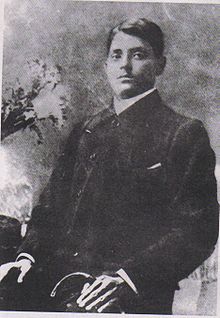Jatin Mukherjee
| Jatindranath Mukherjee | |
|---|---|

Jatindranath Mukherjee, also known as Bagha Jatin
|
|
| Born |
7 December 1879 Kushtia, Bengal Presidency, British India (Now Bangladesh) |
| Died | 10 September 1915 (aged 35) Balasore, Bengal Presidency, British India |
| Other names | Bagha Jatin |
| Organisation | Jugantar |
| Movement | Indian Independence movement, Indo-German Conspiracy, Christmas Day plot |
Bagha Jatin (Bāghā Jatin, lit: Tiger Jatin), born Jatindranath Mukherjee (Jotindrônāth Mukhōpaddhāē) (7 December 1879 – 10 September 1915) was a Bengali revolutionary philosopher against British rule.
He was the principal leader of the Yugantar party that was the central association of revolutionaries in Bengal. Having met the German Crown-Prince in Calcutta shortly before World War I, he obtained the promise of arms and ammunition from Germany; as such, he was responsible for the planned German Plot during World War I.
Another of his original contributions was the inspiration of the Indian soldiers in various regiments in favour of an insurrection.
Jatin was born to Sharatshashi and Umeshchandra Mukherjee in Kayagram, a village in the Kushtia subdivision of Nadia district in what is now Bangladesh. He grew up in his ancestral home at Sadhuhati, P.S. Rishkhali Jhenaidah until his father's death when Jatin was five years old. Well versed in Brahmanic studies, his father liked horses and was respected for the strength of his character. Sharatshashi settled in her parents' home in Kayagram with her husband and his elder sister Benodebala (or Vinodebala). A gifted poet, she was affectionate and stern in her method of raising her children. Familiar with the essays by contemporary thought leaders like Bankimchandra Chatterjee and Yogendra Vidyabhushan, she was aware of the social and political transformations of her times. Her brother Basanta Kumar Chatterjee (father of Indian revolutionary and parliamentarian Haripada Chattopadhya) taught and practised law, and counted among his clients the poet Rabindranath Tagore. Since the age of 14, Tagore had claimed in meetings organised by his family members equal rights for Indian citizens inside railway carriages and in public places. As Jatin grew older, he gained a reputation for physical bravery and great strength; charitable and cheerful by nature, he was fond of caricature and enacting mythological plays, himself playing the roles of god-loving characters like Prahlad, Dhruva, Hanuman, Râja Harish Chandra. He not only encouraged several playwrights to produce patriotic pieces for the urban stage, but also engaged village bards to spread nationalist fervour in the countryside. Jatin had a natural respect for the human creature, heedless of class or caste or religions. He carried for an aged Muslim villager a heavy bundle of fodder and, on reaching her hut, he shared with her the only platter of rice she had, and sent her some money every month.
...
Wikipedia
